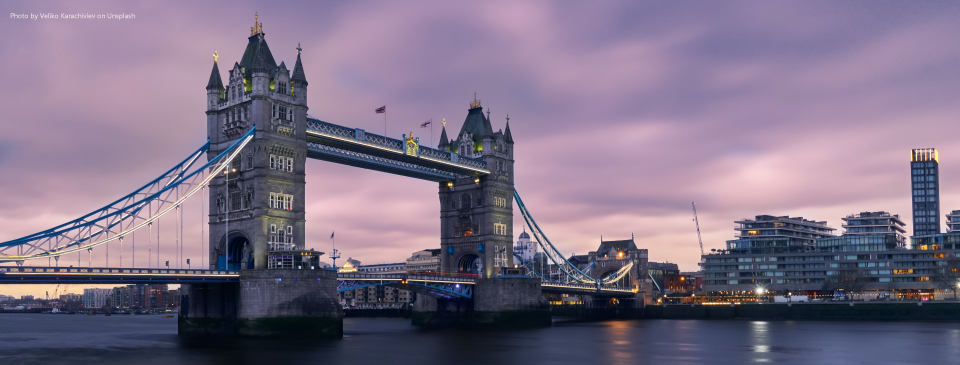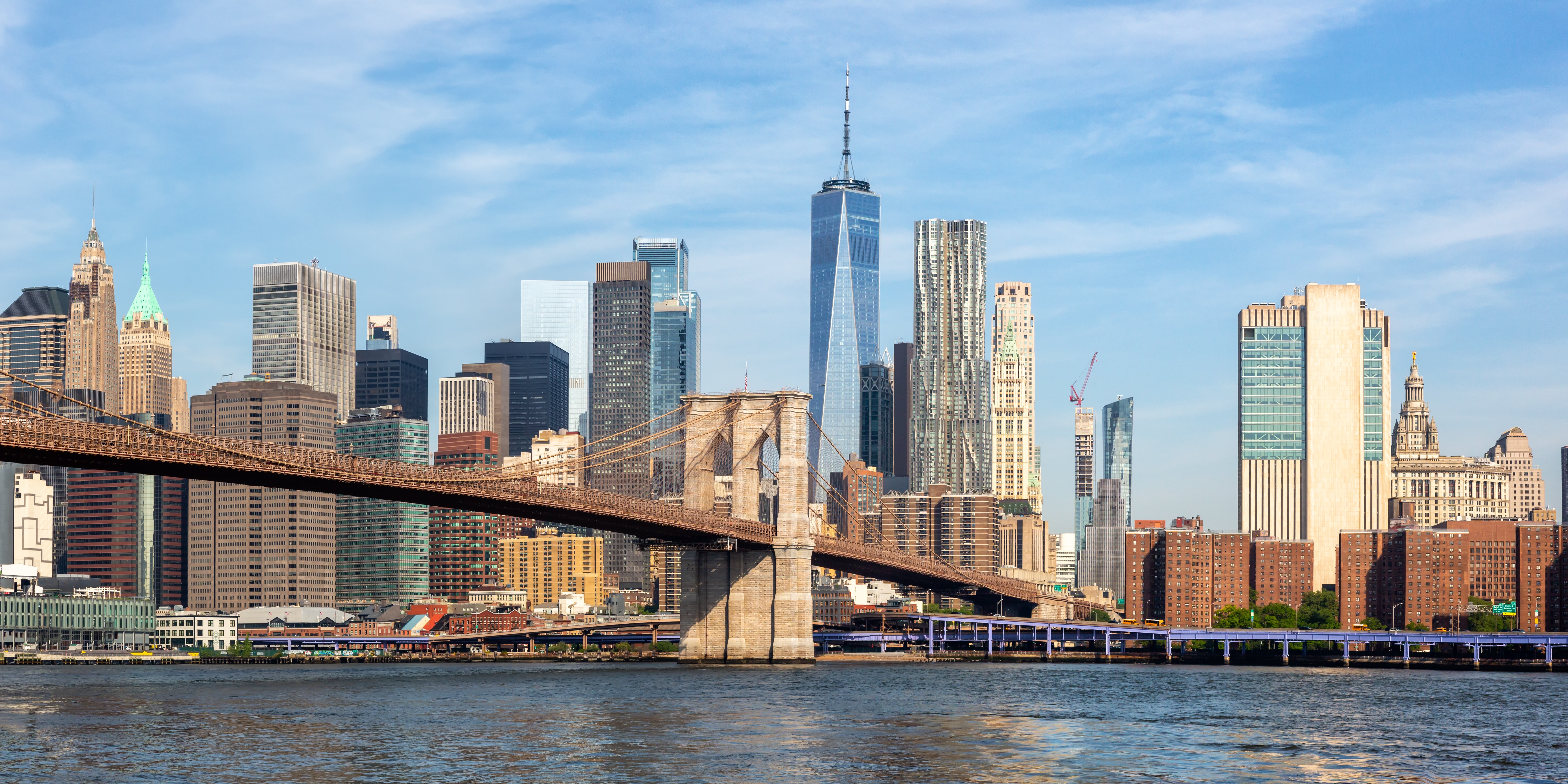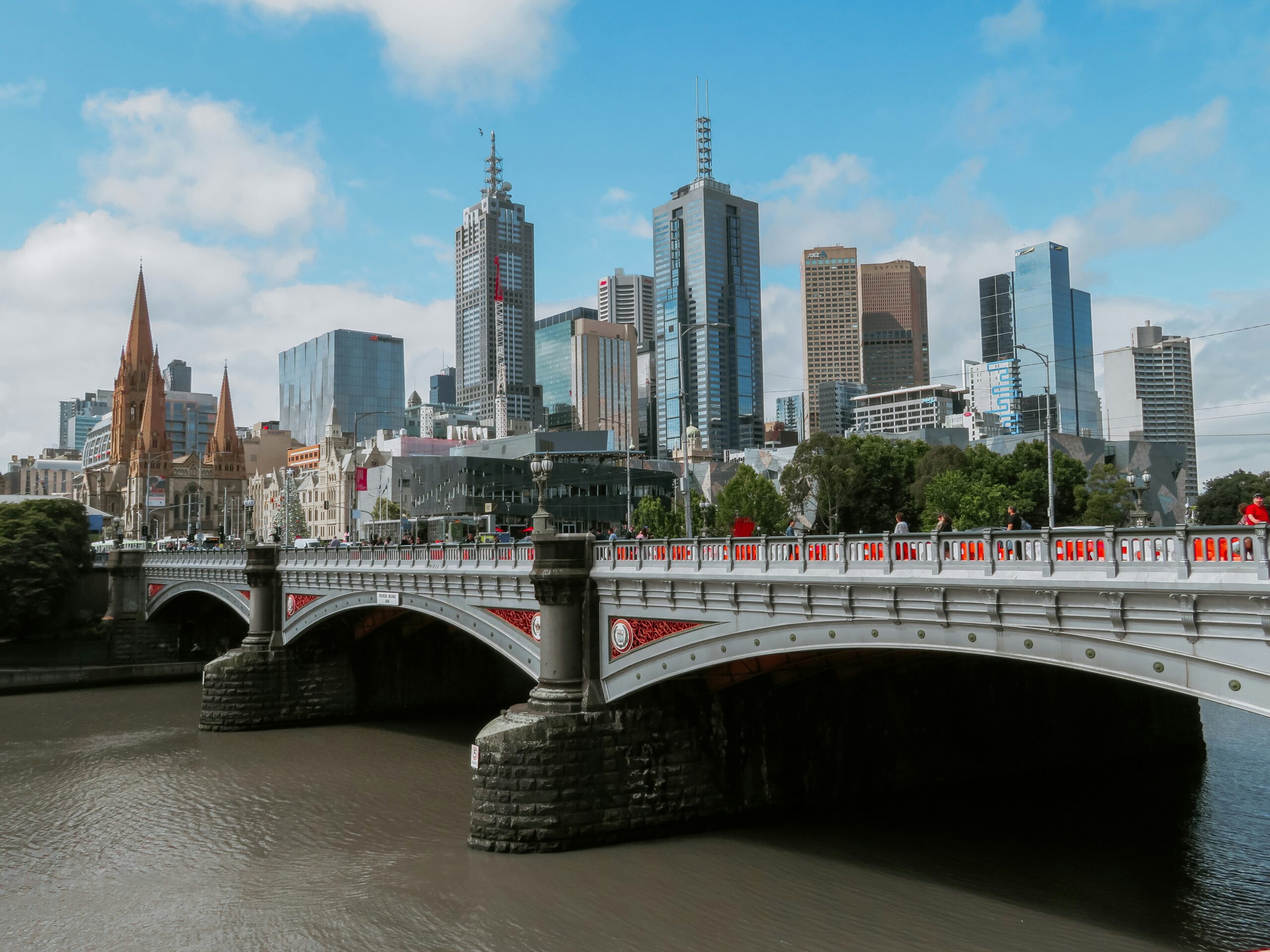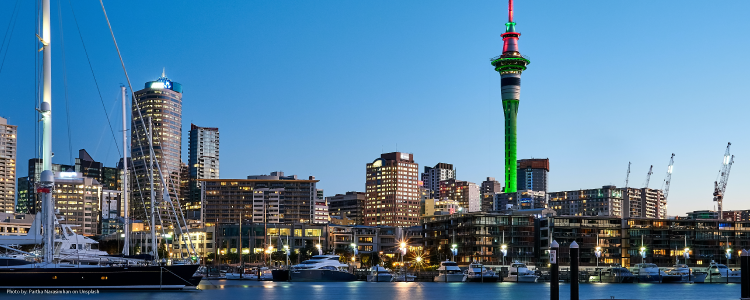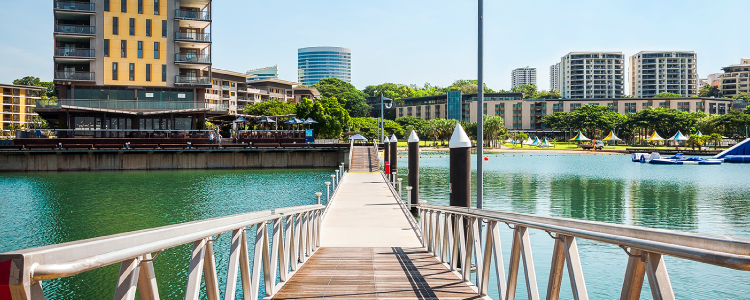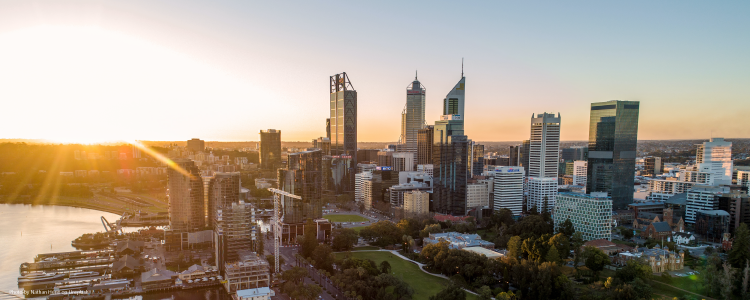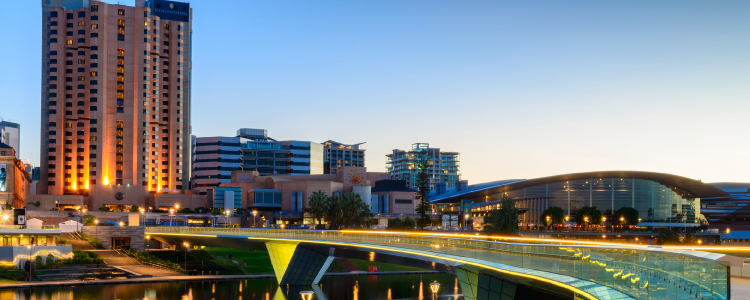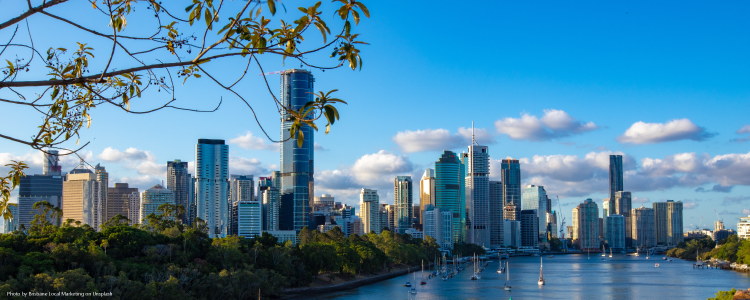There are many reasons why thousands of people move to London, from its culture, art and music scene to numerous job opportunities. Currently, 9 million people call London home, of this 37%1 were born outside of the UK. Majority of these individuals are of Indian descent with 300,000 Londoners born in India, followed by 135,000 from Nigeria and 118,000 from Italy.1
Entry requirements
Visa
If you’re moving to London for work and your job involves managerial of skilled administrative roles, then you may be eligible for the Skilled Worker Visa. This visa allows you to stay in the UK for up to 5 years, and “after 5 years, you may be able to settle permanently in the UK”2.
If you’re part of a multinational organisation, then you may be eligible for an Intra-Company Visa. This visa allows you to “come to or stay in the UK to do an eligible job at your employer’s UK branch”.3 There are two types of Intra-Company Visas:
- Intra-company transfer visa: for individuals who have been employed with their employer for than 12 months
- Intra-company graduate trainee visa: for those who have been with their employer for at least 3 months prior to their application
There are certain requirements you must meet to qualify for the Intra-company transfer including3:
- be an existing employee of an organisation that’s been approved by the Home Office as a sponsor
- have a ‘certificate of sponsorship’ from your employer with information about the role you’ve been offered in the UK
- do a job that’s on the list of eligible occupations
- be paid at least £41,500 for an Intra-company Transfer visa or at least £23,000 for an Intra-company Graduate Trainee visa
Other visas available include:
- Health and Care Worker Visa – for medical professionals
- Global Talent Visa – for individuals who are “leaders or potential leaders in digital technology specializing in FinTech, Gaming, Cyber Security and Artificial Intelligence”4
- Innovator Visa – eligible for those who are planning “to set up and ran innovative business in the UK, or for those whose business or business idea has been endorsed by an approved body”5
In addition, if you’re moving to London with your partner or family, you’ll need to apply for Family visa. Your partner or family can apply for a Family Visa outside and within the UK. The results of the visa usually take 8-12 weeks depending on where you apply, in addition you and your partner must meet the minimum income requirement of £18,600 combined per year, and £3,800 for your first child, and an additional £2,400 for each child after6.
There are circumstances when you may be refused a family visa including6:
- Your family member has a work visa or student visa
- You hold a visitor visa or a visa for 6 months or less
Working and living in London
Healthcare
Australia has one of the best healthcare systems in the world, however, as we know, not every country offers the same medical care and treatment as we do. In saying this, thanks to our Reciprocal Health Care Agreement (RHCA) with the UK. The RHCA allows Australian citizens to access “medically necessary care when they visit certain countries”7. The RHCA allows you to “access subsidised healthcare under the public health system in place at that destination; in other words, you’ll be covered by that country’s version of Medicare.”8 The RHCA does not cover certain “medical expenses, including ambulance services, dental treatment, elective treatments and treatment in private hospitals”8.
Employment
Before you begin your new role in London, don’t forget to:
- Familiarise yourself with the UK Tax system – According to TaxBack.co.uk, “UK taxation for employees is done through the PAYE system, where income tax and National Insurance contributions are automatically deducted from your salary by your employer.”9 However, those employed as a consultant or contractor “with payment made through an intermediary, will have to comply with the UK tax legislation known as IR35”9. To learn more about the difference between the Australian and UK tax system, read Wilkie’s article here.
- Learn how to open an UK bank account from Australia – unfortunately, you’ll need to a UK address to open a bank account in the UK. In addition, some providers require a high deposit amount to be eligible. However, there are now providers such as Wise that allows you to “hold, receive, send and spend money using a multi-currency account”10. To learn more, visit this page.
- Read Expatica’s ‘Understanding the UK pension system for expats’ article – to learn about the UK pension system. If you’re planning to return and retire in Australia, you’ll need to check if your superannuation fund is a Qualified Recognised Overseas Pension Scheme (QROPS) or Recognised Overseas Pension Scheme (ROPS). “QROPS allows expats to consolidate their pensions into one plan. This helps them manage their retirement funds more easily and avoid currency fluctuations.”11
Job Boards
If you’re unemployed when you arrive in the UK and still on the hunt for your next opportunity, you may to try the following job boards:
Industries
According to London Data Store12, 29.1% of London’s workforce is employed under Public Admin, Education and Health industry. This is followed the Banking, Finance and Insurance with 27.3%, 14.1% in Distribution, Hotels and Restaurant and 12.3% in Transport and Communication.
Education
School Structure
In the UK, there are five stages of education:
- Early years
- Primary
- Secondary
- Further Education – This differs to university and “includes education for people over 16 [and] is primarily taught in FE colleges, work-based learning and adult and community learning institution”13
- Higher Education
Types of Schools
There are four types of school you can enrol your children in the UK:
- Community schools – generally run by local authority
- Foundation and voluntary schools – these are usually supported by representatives from religious groups
- Academies and free schools – independent from local authority and ran by non-for-profit academy trusts
- Grammar schools – “students are chosen based academic ability”14 and must complete a test to be admitted
School Terms
The school year in the UK starts in August or September and ends in June or July depending on the region. School holiday includes summer breaks, Christmas, Easter and half terms, which run for a week.
A typical school day starts at 8:30 or 9:00am and ends at 3:30 or 4:00pm.
Higher Education and Post-High School Training
The UK is home to some of the best universities in the world, including the University of Oxford and University of Cambridge. In London, older children can enrol in the Imperial College of London, University of College London, King’s College London and London School of Economics and Political Science (LSE).
Your new home
London is a big a city, so choosing the location of your new home can be tricky. In saying this, we’d recommend Notting Hill, Hampstead, Richmond and East Finchley for families, as they’re known for great schools and efficient public transport.
Singles may enjoy Camden, Battersea, Chelsea, Shoreditch and Brixton, for a more social and vibrant experience.
To rent or buy
There’s no doubt that London is an expensive city. If you’re moving to London temporarily, you may want to consider renting a property rather than purchasing a new abode. In saying this, “there are no restrictions on expats buying property in the UK. Also, foreigners and non-residents are able to get a mortgage in the UK.”15 Buying a home will incur a bigger cost and will mean additional paperwork for you to complete. However, if you want to browse properties in London, we recommend you check out Right to Move. Right to Move also allows you to browse rental properties in the UK.
Reminder: Don’t forget to explore and consider the location and your lifestyle when choosing a property. You’ll want to make sure that your new home is near all places you’ll be visiting frequently such as schools, public transport, shopping and recreation areas.
If you’ve decide to rent, then keep in mind that most rental properties in London “generally comes complete with main kitchen appliances such as a fridge and washing machine, plus bedroom and living room furniture.”16 In addition, make sure you when you’re shopping around to ask whether the rental price is inclusive or exclusive of bills. “When a place is advertised with bills inclusive, it generally means the rent covers the price of gas, electricity and water.”16 Council tax may or may not be included so make sure you check this as well. Other expenses such as telephone bills, car parking spaces and gym fees will not be included. Also, just like Australia, “major repairs to the property are the landlord’s responsibility, as is the upkeep of gas appliances, which, by law, must be serviced annually. Tenants, for their part, have a duty to keep the property they are renting and its contents in good general order.”16
According to Numbeo, the cost of living in London for:
- “Family of four estimated monthly costs are 5,349.11A$ (3,059.43£) without rent (using our estimator).
- A single person estimated monthly costs are 1,542.07A$ (881.99£) without rent.
- London is 3.94% less expensive than Sydney
- Rent in London is, on average, 18.49% higher than in Sydney.”17
Renting in London is more expensive than renting in Sydney, the table below will provide a cost comparison of living expenses between Sydney and London. Data attained from Numbeo17:
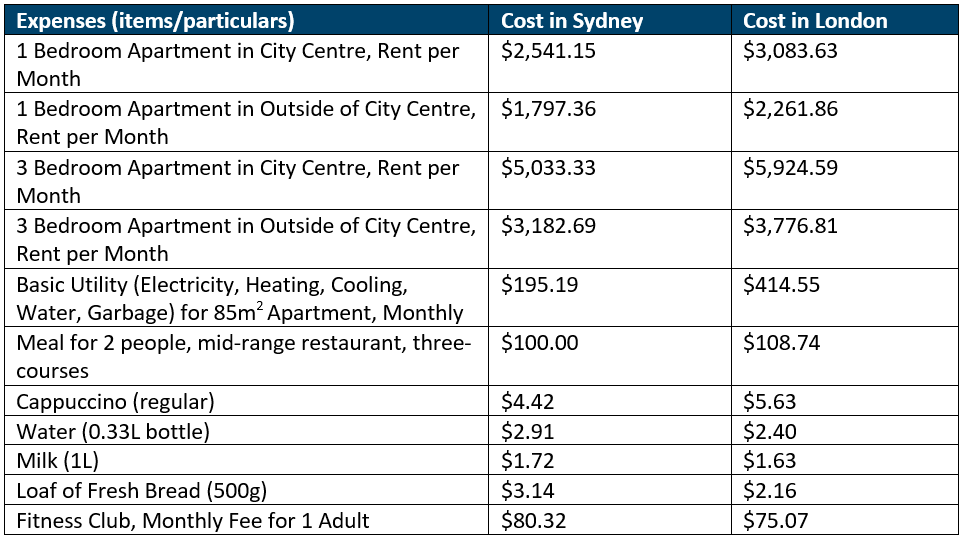
The above table shows that London is definitely a more expensive city to live in. However, food items such as a loaf of fresh bread, a litre of milk and a bottle of water is cheaper. In addition, clothing and shoes items are more affordable in London compared to Sydney. For example, a pair of jeans cost $115.41 in Sydney and $113.71 in London, while a pair of Nikes running shoes (mid-range) is $154.66 in Sydney and $133.52 in London.17
Getting around
Public transport
As a bustling metropolis, with more than 9 million residents, London has created an extensive and connected public transport system that is known all over the globe. There are 6 modes of public transportation that will take you where you need to go:
- Bus
- The Tube or the Underground
- Docklands Light Railway (LDR)
- Riverboat, London’s Overground
- Trams
- Taxi
London’s Underground will take you to, from and around Central London. This map from visitlondon.com will help you navigate the Tube’s rail network. While the London Overground “forms a circle around the capital, with branches extending into additional neighbourhoods. London Overground services go through stations such as Stratford, Euston, Shoreditch High Street, Hampstead Heath, Shepherd’s Bush and Kensington Olympia.”18
Oyster cards
The London equivalent to Sydney’s Opal card is an Oyster Card. “Visitor Oyster cards* and Oyster cards are electronic smartcards that you can top up with credit to spend on travel on the Tube, buses, Docklands Light Railway, Uber Boat by Thames Clippers river service, London Overground, TfL Rail and most National Rail services in London.”19 You can buy a Oyster Card online, at TfL Visitor Centre, stations and Oyster ticket shops. A card cost £5 which you can top-up as needed. Of course, you can purchase paper Travelcards and single tickets, but trips using an Oyster card is cheaper.
Personal Vehicle
If you want to take your personal vehicle with you, you can ask about Grace’s vehicle shipping service. Grace offers a safe and cost-effective solution for shipping cars from anywhere in Australia to the United Kingdom, Ireland or New Zealand. Our international car shipping service can also accommodate 4WDs, SUVs, trailers, motorcycles as well as classic and vintage car. Ask your International Removals Specialists for more info or submit this online quote.
Weather
London has warm and temperate climate with significant annual rainfall of 690 mm20. “Rain is frequent during the whole year, so it’s a good idea to always carry an umbrella or raincoat when visiting the city. Although it rains quite often, it is usually a drizzle.”21
Seasons
According to London Perfect, Autumn is the wettest season with the average rainfall of 71mm in October.22
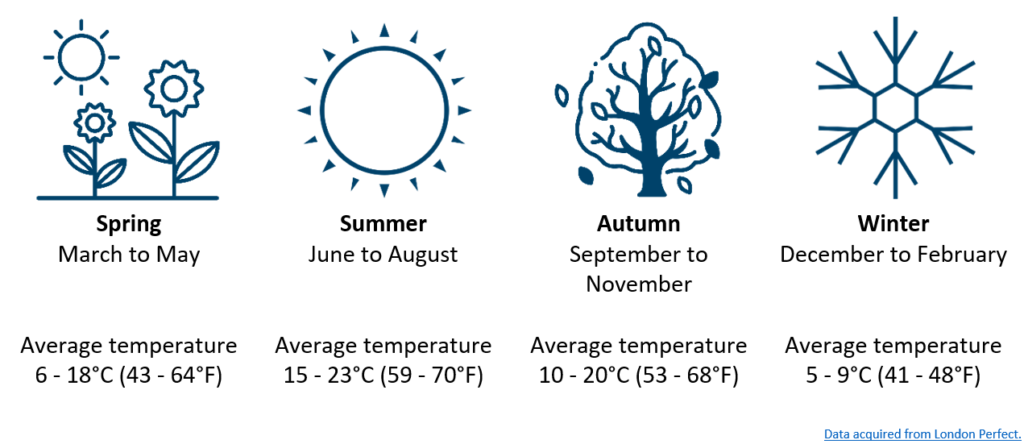
Life in London
London’s rich history and culture means that you’ll never be bored. It’s known for its strong sports culture, a thriving food and wine scene, countless events as well as plays, musicals and shows that will keep you and your family entertained. Of course, you can’t forget about its renowned tourist attractions such as the Big Ben, Buckingham Palace, Westminster Abbey and the Tower of London. Finally, art lovers will be spoilt for choice with new exhibitions and famous art galleries such as The National Gallery, Tate Britain, Whitechapel Gallery and Dulwich Picture Gallery.
2 GOV.UK, n.d., Check if you need UK visa: Information based on your answers.
3 GOV.UK, n.d., Intra-company visas
4 GOV.UK, n.d., Work in the UK as a leader in digital technology
5 GOV.UK, n.d., Innovator visa
6 GOV.UK., n.d., Family visas: apply, extend or switch
7 Finder.com.au. 2021, Reciprocal health care agreement (RHCA)
8 Finder.com.au, 2021, Expat health insurance
9 Taxback.co,uk, 2022, Tax traps for Australian working in the UK
10 Wise Australia, 2022, Multi-currency account
11 Expatica, 2022, Understanding the UK pension system for expats
12 London DataStore (ONS), 2020, Employment by Industry, Borough
13 “Education System in the UK”, retrieved from: https://assets.publishing.service.gov.uk/government/uploads/system/uploads/attachment_data/file/219167/v01-2012ukes.pdf
14 GOV.UK, n.d., Types of school
15 Expatica, 2021, Guide to buying a home in the UK
16 Expatica, 2021, Renting accommodation in London
17 Numbeo, 2022, Cost of living comparison between Sydney and London
18 Visit London, n.d., Free London travel maps
19 Visit London, n.d., Oyster cards and travelcards in London
20 Climate-Data.org, n.d., Climate London
21 Climate of London
22 London Perfect, Weather and Seasons
